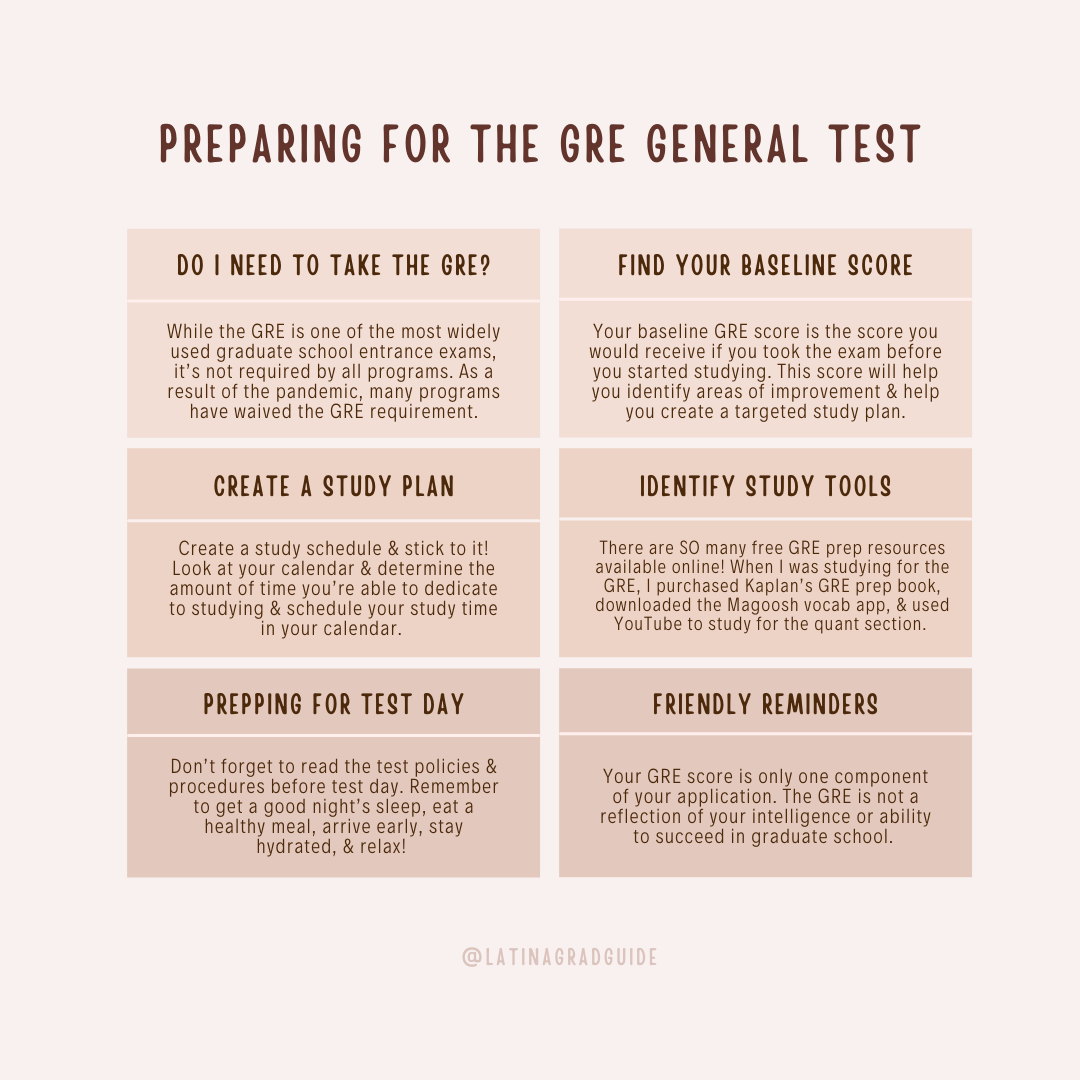The Graduate Record Examination (GRE) is a standardized test required for admission by some graduate school programs. According to the Educational Testing Service (ETS), the nonprofit educational testing and assessment organization that administers the GRE, GRE scores are used by graduate programs to “successfully identify applicants who are academically prepared for graduate-level work and to help them enroll a diverse student body.” Critics of the GRE argue that the test perpetuates racial, ethnic, and class inequities. As a result, numerous universities have eliminated the GRE requirement while others have given departments the autonomy to decide whether or not to require the GRE for graduate admission. If you are applying to graduate school and are required to take the GRE, keep reading to learn more about the exam and how to prepare!
Side note: In the U.S., the fee to take the GRE is $205. Having trouble paying the fee? Learn about the GRE Fee Reduction Program here: https://www.ets.org/gre/revised_general/register/fees/reducti
- Determine whether or not you need to take the GRE
While the GRE is one of the most widely used graduate school entrance exams, it’s not required by all programs. As a result of the pandemic, many programs have waived the GRE requirement while others have waived the exam for applicants with exceptionally high undergraduate GPAs. Even if you aren’t required to take the exam, you might decide to take the GRE to mitigate a low undergraduate GPA. Don’t forget to connect with a graduate program representative and/or faculty to get program specific information about entrance exams.
- Find your baseline
Once you’ve determined whether or not you need to take the GRE, it’s important that you understand your baseline. Your baseline GRE score is the score you would receive if you took the exam before you started studying. This score will help you identify content areas you need to improve and help you create a targeted study plan. Remember to take this practice test under the same testing conditions as the “real” exam (e.g. take the practice test in a quiet setting free from distractions, turn off your cell phone, adhere to the same time restrictions, etc.).
- Create a study plan
Now that you understand your baseline score, create a study schedule and stick to it! It’s recommended that individuals allot 3 months to study for the GRE. However, this timeframe will vary depending on various factors including your baseline score and target score. Look at your calendar and determine the amount of time you’re able to dedicate to studying and schedule your study time in your calendar.
When I was studying for the GRE, I studied for about 2-3 hours a day, 3-4 days a week. In my study schedule, I specified the sections I was working on each day (e.g. analytic writing, verbal reasoning, quantitative reasoning) and I worked on vocabulary throughout the week using a vocab app on my phone. Whenever I went on a walk or was taking a break (I was working full-time when I was studying for the GRE!) I would take out my phone and practice!
Remember to take a few practice tests before your exam. Each practice test you take will help you develop your test-taking skills and help you become more familiar with the exam. Don’t forget to review your scores!
- Study tools
There are SO many free GRE prep resources available online! Here are a few:
ETS: https://www.ets.org/gre/revised_general/prepare/powerprep/
The Princeton Review: https://www.princetonreview.com/grad/free-gre-practice-test?ceid=nav-gd#!practice
Kaplan, Inc: https://www.kaptest.com/gre/free/free-gre-practice-test
Magoosh: https://magoosh.com/gre/gre-practice-test/
When I was studying for the GRE, I purchased Kaplan’s GRE prep book, downloaded the Magoosh vocab app, and used YouTube for the quant section (I literally started from basic arithmetic and worked my way up!).
Stay tuned for my next GRE prep book giveaway on @latinagradguide
- Prepping for test day
Don’t forget to read the test policies and procedures before test day. Remember to get a good night’s sleep, eat a healthy meal, arrive early, stay hydrated, and relax! On test day, and upon confirming your scores, you will have the option to send your score report to four universities for free. Make sure to identify the four schools beforehand. If you’d like to send your score report to additional recipients, you can order additional score reports for a fee of $27 per recipient. If you are unhappy with your scores, you have the option of retaking the exam. Per the ETS website, you can take the GRE General Test once every 21 days, up to five times within any continuous rolling 12-month period (365 days). This applies even if you canceled your scores on a test taken previously.
Reminders
Your GRE score is only one component of your application.
The GRE is not a reflection of your intelligence or ability to succeed in graduate school.


